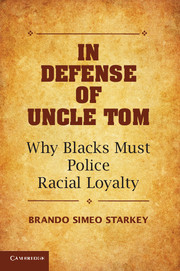Book contents
- Frontmatter
- Dedication
- Contents
- Acknowledgments
- Introduction
- 1 Solidarity, Social Norms, and Uncle Tom
- 2 Uncle Tom: 1865–1959
- 3 The Unwitting Pioneers
- 4 Uncle Tom: 1960–1975
- 5 No Man Was Safe
- 6 Uncle Tom Today: 1976–Present
- 7 So What About Clarence?
- 8 The Curious Case of Uncle Tom
- 9 What Now, Uncle Tom?
- Final Address
- Index
- References
6 - Uncle Tom Today: 1976–Present
Published online by Cambridge University Press: 05 May 2015
- Frontmatter
- Dedication
- Contents
- Acknowledgments
- Introduction
- 1 Solidarity, Social Norms, and Uncle Tom
- 2 Uncle Tom: 1865–1959
- 3 The Unwitting Pioneers
- 4 Uncle Tom: 1960–1975
- 5 No Man Was Safe
- 6 Uncle Tom Today: 1976–Present
- 7 So What About Clarence?
- 8 The Curious Case of Uncle Tom
- 9 What Now, Uncle Tom?
- Final Address
- Index
- References
Summary
Where Is Uncle Tom?
Writing with certainty is hard here. Nevertheless, I feel confident in claiming that Uncle Tom surfaces now far less than previously. Before the mid-1970s, Uncle Tom was ubiquitous. A welcome guest sometimes, and sometimes anything but. On good days, Uncle Tom helped boost black solidarity, on bad days, the opposite. Constructive or destructive, one never knew which Uncle Tom would appear.
But Uncle Tom is not missing. We can still document its footprint on American culture, especially when searching twenty-first-century media – Twitter, comments sections to online articles, blogs, and the like. Uncle Tom has found society’s new venues. Increasingly larger shares of black folk, however, have stopped giving breath to Uncle Tom. Well-to-do blacks more so than the man on the street, I think, have developed an unmistakable hesitancy in resuscitating the slur.
Also noteworthy is that average blacks are now much less likely to be accused of racial treachery than are more famous blacks. That is not to say that the common man is never terrii ed that the specter of Uncle Tom will be directed toward him. He is. But inl uential blacks are much more concerned. The link between treachery and power has strengthened.
- Type
- Chapter
- Information
- In Defense of Uncle TomWhy Blacks Must Police Racial Loyalty, pp. 232 - 253Publisher: Cambridge University PressPrint publication year: 2015



